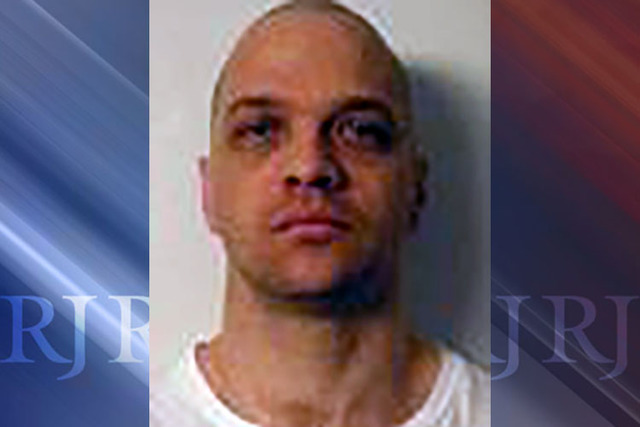While an inmate asks to die, Nevada searches for lethal injection cocktail

Scott Dozier wants to die.
And Nevada wants to kill him.
He is one of 81 men on death row, but the state Department of Corrections can’t find the drugs to carry out lethal injection, even after spending $860,000 to build a new execution chamber in Ely.
After sitting on death row for more than nine years, Dozier sent a handwritten, two-page letter to his attorneys and District Judge Jeniffer Togliatti on Oct. 31 requesting that his appeal process cease and he “be put to death.”
The 46-year-old, also known as Chad Wyatt, Raymond Dozier, Scott Raymond Dozier and Chadwick Quincy Wyatt, offered no explanation for giving up on the legal system and, in turn, life.
State prison officials recently said that obtaining the drug cocktail for lethal injection has proved nearly impossible.
Less than a month before Dozier delivered his letter, prison officials announced that they had sent out 247 requests for proposals after a stockpile of at least one drug used in executions expired, and not one response was received. It’s unclear whether the state has other options to obtain the drug.
Nevada’s last execution, by lethal injection, occurred at the Nevada State Prison in April 2006.
The state has executed 12 inmates since capital punishment was reinstated by the Nevada Legislature in 1977. All but one were inmates who, like Dozier, voluntarily gave up their appeals.
A Michigan Law Review article written two years before Dozier was sent to death row analyzed cases of death penalty volunteers and found that nearly 88 percent of those inmates “struggled with mental illness and/or substance abuse,” according to the Death Penalty Information Center.
The prison has no execution orders pending, but Dozier’s could be the next.
When asked what would happen if Dozier’s execution were ordered by a judge, a Corrections Department spokeswoman responded in an email, which stated: “We’ve exhausted all current options of obtaining drugs for executions. NDOC is working closely with the Attorney General’s Office, the Governor’s Office and will be working with the Legislature to establish our direction moving forward.”
Officials with the Nevada attorney general’s office declined to comment.
Gov. Brian Sandoval said in October that a lawmaker could propose to abolish capital punishment in the state, but the governor added that he would not make the suggestion.
Meanwhile, the Clark County district attorney’s office filed court documents asking Togliatti to decide whether Dozier is mentally capable of understanding his death wish.
Dozier “has the right to stop litigating his case,” wrote Chief Deputy District Attorney Jonathan VanBoskerck , “even if his choice is to submit to a death sentence.”
“We don’t force people to undergo invasive competency evaluations just because we disagree with their decision,” VanBoskerck said in an interview with the Las Vegas Review-Journal.
Meanwhile, defense lawyer Christopher Oram argues that Dozier should be evaluated by doctors through a separate competency proceeding, which could take months.
Oram declined to comment further on the case.
A two-time killer, Dozier was given the death penalty in October 2007 after a four-week trial for the murder and mutilation of an Arizona man in a Strip hotel.
Dozier was convicted of killing 22-year-old Jeremiah Miller at the now-closed La Concha Motel and robbing him of $12,000 that Miller had brought from Phoenix to Las Vegas to purchase materials to make methamphetamine.
Miller’s torso, cut into two pieces, was found in April 2002 in a suitcase in a trash bin at an apartment complex. His head, lower arms and lower legs were never recovered.
In 2005, Dozier was convicted in Arizona of second-degree murder and given a 22-year prison sentence. In that case, prosecutors said he shot and killed a 27-year-old man, stuffed his body into a plastic container and dumped it in the desert near Phoenix.
The Nevada Supreme Court upheld Dozier’s death sentence in 2012.
Life on death row can be lonely and boring, with the inmates isolated in a cell for all but one hour a day, and Dozier explained as much in a fan letter he sent to Vice magazine in 2013.
“I’ve written the magazine before to no avail,” he stated, “and will likely continue to until the government-sanctioned murder of my corporeal being (and maybe my “soul” too, guess we’ll see), as I’ve got a surplus of time on my hands and a catastrophic dearth of intelligence, hilarity, and awesomeness. I can only draw and work out so much.”
Another defense attorney, Scott Coffee, who has handled roughly 20 death penalty cases in the past 15 years, called the pursuit of capital punishment in Nevada “a catastrophic waste of money.”
“The current state of affairs is we don’t have the means to execute people, irrespective of what new building we may have put up,” Coffee said. “We’re pushing forward with something we don’t have the means of carrying out. And you have to wonder what the money’s being spent for.”
Coffee, who analyzes death penalty cases across the country, said the issue is not exclusive to Nevada.
“It’s simply pulling us in line with the rest of the civilized world,” he said.
Contact David Ferrara at dferrara@reviewjournal.com or 702-380-1039. Follow @randompoker on Twitter.
RELATED
Nevada’s new $860,000 execution chamber is finished but gathering dust
Nevada pursues death chamber, controversial drug
Nevada has 80 on death row, but no place to execute


















